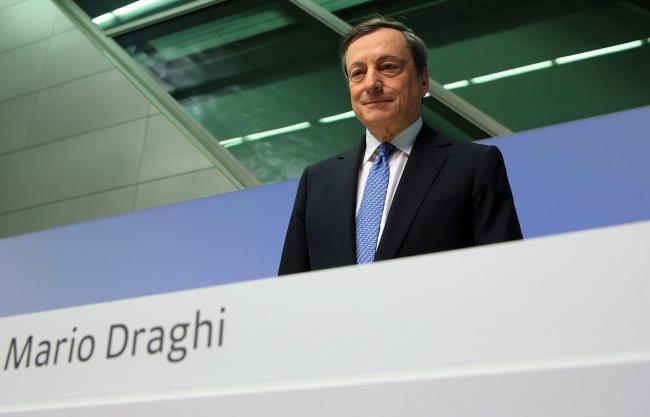(Bloomberg) -- It took a little help from Mario Draghi to stir European equities from their slumber.
The European Central Bank’s slow approach to reducing monetary stimulus spurred the Euro Stoxx 50 Index’s biggest rally since Sept. 11. Before Thursday, the gauge went virtually nowhere in October, and correlation between its shares at the lowest in at least six years suggested that individual company earnings spurred traders more than broader factors such as political risk or economic data.
The benchmark’s 1.3 percent advance, the biggest on an ECB decision day in 2017, showed President Draghi still holds sway over the region’s stocks. While the institution said it will reduce the size of its monthly bond purchases, Draghi’s emphasis on the need to tread carefully provided a fresh impetus to bulls that have already sent $39 billion to European stock funds this year.
“Markets have been doing nothing all month and then Draghi comes up with what is essentially QE infinity,” said Teis Knuthsen, chief investment officer at Saxo Bank A/S’s private-banking unit in Hellerup, Denmark. “We will have very accommodative policy beyond 2018 at a time where the cyclical environment is bullish. It’s a really dovish signal.”
Bond-buying will continue through September 2018, albeit at 30 billion euros ($35 billion) a month starting January -- half the current pace. The cut was in keeping with economists’ estimates, and policy makers pledged to step up or prolong buying if needed. The ECB also stressed that it will reinvest proceeds from maturing debt for an extended period after its asset-purchase program ends.
The statement managed to subdue the euro -- the one hiccup in 2017 for the equity market. European firms get roughly half their sales from outside the region, according to JPMorgan Chase & Co (NYSE:JPM). This year’s strength in the currency, which climbed above $1.20 during Draghi’s last press conference, has threatened to erode profitability, but consensus is building among investors that exporters can handle the euro at current levels.
Dovish Draghi
“Draghi managed to be as dovish as he could have been within the context of policy that is becoming less loose, and he got the natural response of a weaker euro and higher European equities,” Daniel Murray, global head of research at EFG Asset Management, said by phone. “The wind is certainly in the sails now for the region’s stocks.”
Recent data have underscored the strengthening recovery in the euro-area economy, while JPMorgan says European companies are showing profit growth that’s twice the pace of their U.S. counterparts in the third quarter. The Euro Stoxx 50 rose another 0.4 percent on Friday, extending its best annual performance since 2013.
“The positive story for European equities continues -- today was not a game changer, rather just a confirmation,” Vincent Juvyns, a Brussels-based global market strategist at JPMorgan Asset Management, said by phone on Thursday. “Euro-area equities remain the sweet spot for investors.”
